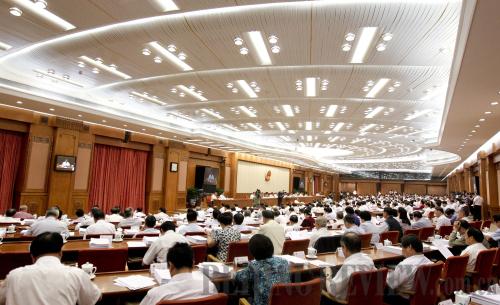|
 |
|
LAWMAKING PROCESS: The Standing Committee of the National People's Congress hold the second reading of the draft amendment to the Budget Law on June 26 (DING LIN) |
In recent years, China's fiscal revenues have shown leapfrog growth. According to the Ministry of Finance (MOF), the country's fiscal revenues grew 24.8 percent year on year in 2011 to hit a record high of 10.37 trillion yuan ($1.63 trillion), of which the central fiscal revenues reached 5.13 trillion yuan ($807 billion), up 20.8 percent from the previous year. Meanwhile, local governments collected 5.24 trillion yuan ($824 billion), a year-on-year increase of 29.1 percent.
However, accompanying the robust fiscal increase is the absence of a corresponding budget system. As more reports concerning huge government expenses appear in the media, calls for reforming the existing budget system have become louder.
"Since 1994, when China implemented a major fiscal reform redefining the distribution of fiscal incomes between central and local governments, the country has become a big power in finance. With changes in the national situation, the public has become more concerned about the openness of the government budget," said Lu Wei, a member of the Standing Committee of the National People's Congress (NPC), China's top legislature, adding that circumstances require revising the current Budget Law.
Last December, the Budget Law ushered in its first amendment since it went into effect in 1995. On June 26, a bi-monthly session of the NPC Standing Committee conducted the second reading of the draft amendment to the law and the proposed changes were published online to seek public opinion from July 6. As of August 5, the deadline of the month-long feedback period, more than 331,000 comments and suggestions were submitted.
This is the second largest number of comments received by a draft law since the practice of publishing drafts online for feedback was introduced in 2005. The largest number, 560,000 comments, was received in response to a Labor Contract Law draft amendment that is being revised. A proposed amendment that would slash the tax burden levied on personal income elicited more than 230,000 comments last year.
A new clause in the draft clarifies that a government budget includes four aspects, which are public budget, governmental fund budget, state-owned capital operation budget and social security budget. For the first time, the draft requires governments at all levels to include all revenues and spending in their annual budgets and proposes all government budgets except those implicated in classified state secrets must be revealed to the public in a timely fashion after being approved by lawmakers.
All budget planning must take into consideration the current economic and social conditions as demonstrated by detailed lists of items, the draft stipulates. No undeclared income from the previous year is allowed to be counted in a new year's record.
"Considering the proposal, a strict performance evaluation system is needed as a key measure when setting government budgets over the next year, to ensure the best use of state resources," said Li Peilin, a national lawmaker.
Meanwhile, the exact budget numbers, as well as methods for adjustment and public releases, will be formulated by the State Council, China's cabinet, according to the draft.
The draft also regulates the fiscal transfer payment system. In 2010, tax transfer payments from both the Central Government and between sub-government organs made up about 66.9 percent of the total Central Government's financial costs.
Jia Kang, Director of the MOF's Fiscal Science Research Center, said the clarification of the contents of the government budget and including them into the Budget Law laid a solid foundation to further establish a sound budget system.
"Guaranteeing the public's right to know will lead to rights of suggestion and supervision and decision-making authority, which are the premises of an effective budget system," Jia said.
Liu Jianwen, a financial law professor at Peking University, said the draft made progress in outlawing undeclared incomes and setting up a system to supervise all revenues and spending.
| 